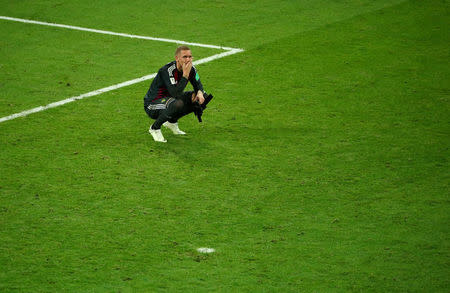Sweden's sports psychologist faces big job before Mexico game
SOCHI (Reuters) - Sweden's sports psychologist Daniel Ekvall will have his work cut out to get the national team back into the right frame of mind for their final group game at the World Cup against Mexico that they will probably have to win to progress.
Ekvall was brought into the set-up by manager Janne Andersson to help them get the most out of their performances, and despite the crushingly late 2-1 defeat by the Germans, he is determined to ensure that they look forward, not back.
"It's to do with the mental recovery, gathering power and energy for the last group game. But otherwise we'll most likely continue similar routines when it comes to how we work and the content of it," he told Reuters.
Germany on three points play Group F's bottom side South Korea (zero points) in their final game, so the Swedes, also on three points, will probably need to beat Mexico to progress.
It used to be seen as the job of the manager to get the players into the right frame of mind for such games, either by cajoling players or shouting at them, but advances in sports science have seen specialists such as psychologists join the support staff.
"There's a number of factors that affect a player's and a team's performances, and psychology is one of those parts," Ekvall said.
"It's hard to say just how important it is, but in today's high-performing teams it's a natural part of preparations for individuals, teams and the leadership team around them."
THREE MAIN STRANDS
The 39-year-old explained that the Swedes follow three main points: making sure the next action on the pitch is done well, improving each other through coaching and positive feedback, and effective leadership through co-operation.
He is quick to dispel the image that some may have of Swedish players lying on a couch telling him about their childhoods.
"It's about group sessions where we educate them about modern sports psychology, driving processes within the theme of making each other better, where we also watch video clips from games with good examples.
"We want to create a climate where the players participate, give their opinions and engage, all to create motivation, and if the players request it I can do individual conversations with them," Ekvall says.
With a global audience of millions watching every game, the pressure to perform can be immense, and the issue of mental health in the game was thrust into the spotlight recently when England's Danny Rose opened up about his struggle with depression.
Ekvall says that though it hasn't happened yet, the Swedish FA are prepared to handle such a situation should it occur at the World Cup.
"There's a scale between normal nerves and tension, which you can learn to accept and focus on playing with nervousness, subjectively feeling bad, and more clinical mental illness," he said.
He also noted that players are only with the national team for a limited time each season, and instead spend most of their time at their clubs.
"The Swedish FA has a network of licensed psychologists and psychotherapists who can help, but ultimately it is the clubs who are employers, and hopefully they also have resources for the issue," he said.
(Reporting by Philip O'Connor; Editing by Hugh Lawson)

 Yahoo Sport
Yahoo Sport 








































